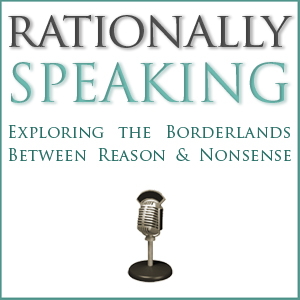Rationally Speaking #172 - Brian Nosek on "Why science needs openness"
Rationally Speaking Podcast
New York City Skeptics
4.6 • 787 Ratings
🗓️ 13 November 2016
⏱️ 48 minutes
🧾️ Download transcript
Summary
Transcript
Click on a timestamp to play from that location
| 0:00.0 | Rationally Speaking is a presentation of New York City skeptics dedicated to promoting critical thinking, skeptical inquiry, and science education. |
| 0:22.6 | For more information, please visit us at NYCCEPictics.org. |
| 0:31.0 | Welcome to Rationally Speaking, the podcast where we explore the borderlands between reason and nonsense. |
| 0:41.4 | I'm your host, Julia Galef, and with me is today's guest, Brian Nozik. |
| 0:45.9 | Brian is a professor of psychology at the University of Virginia. |
| 0:49.3 | He's also the co-founder and director of the Center for Open Science. |
| 0:53.4 | You might have heard Brian mentioned on this show before or heard him in the news. He's famous for a number of things, but in part, he's famous for setting up the reproducibility project, which we discussed on our episode with Yuri Simonson a few months ago, that made a splash in the world of social science by trying and failing |
| 1:14.3 | to reproduce the results of many psychological experiments in top journals. |
| 1:20.7 | So Brian and I are going to talk today about open science and what that means for the field. |
| 1:26.8 | Brian, welcome to the show. Thanks for having me. |
| 1:30.1 | So, uh, what don't you start by talking about what you mean by openness in this context? |
| 1:36.0 | So openness in, uh, for our purposes is two things. One is referring to transparency, the availability of not just the outcomes of the research, |
| 1:47.5 | as in the reports that I write telling you what I found, but also in the content of that |
| 1:53.3 | research, the data, the materials, the methods, the code, the protocols, and in the workflow |
| 1:59.7 | that produced those outcomes. So I had some process of data generation, |
| 2:05.6 | of design, of analyzing that data of coming to inference at the end. And sharing that, making that |
| 2:13.4 | openly available makes it a lot easier for someone independent of me to evaluate the outcomes |
| 2:20.1 | and decide whether they are credible or not. |
| 2:22.7 | That is a core part of openness. |
| 2:25.0 | The other part of openness that we really care about at the center is openness as inclusivity, |
| 2:30.1 | and that is so that anybody who has interest, motivation, time can be involved in the research process in some way. |
| 2:37.7 | Anyone even, not a scientist. |
... |
Please login to see the full transcript.
Disclaimer: The podcast and artwork embedded on this page are from New York City Skeptics, and are the property of its owner and not affiliated with or endorsed by Tapesearch.
Generated transcripts are the property of New York City Skeptics and are distributed freely under the Fair Use doctrine. Transcripts generated by Tapesearch are not guaranteed to be accurate.
Copyright © Tapesearch 2025.

